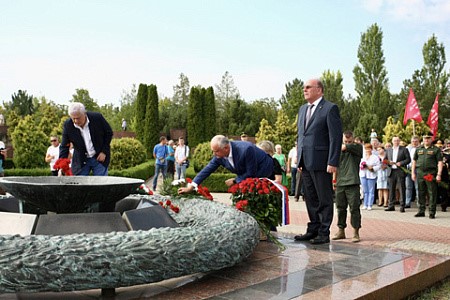Europe or Eurasia, the crossroads of Chişinău
A recent poll confirms the great split in public opinion, whereby 50 percent are in favor of EU membership but 60 percent are against sanctions against the Russians. While Maia Sandu's majority consensus has halved, opposing demonstrations in the capital exalt the polarization of Moldovan society.
Chişinău (AsiaNews) - A "March for Liberation" and a meeting in support of the republic's integration into the Eurasian Economic Union (EAES), organized by the pro-Socialist opposition, was held in the center of Chişinău, the capital of Moldova Russians in controversy with the government's support at the Independence Day of Ukraine in recent days.
From President Maia Sandu to various majority leaders, all have stressed the unity of the Moldovans with the people forced to defend themselves against the Russian invasion.
A recent poll confirms the large split in Moldova's public opinion, whereby 50% are in favor of joining the European Union, but 60% are against sanctions against Russians. If half of the citizens feel European, the others prefer to turn towards the East, or maintain a neutral position towards the two poles of the conflict.
The gaze towards Russia predominates in the breakaway republic of Transnistria, despite being the westernmost area of Moldova, created and occupied by the Russians in Soviet times precisely as an outpost against traditional enemies.
However, Russia retains a great influence on the whole of Moldovan society, and remains one of its main economic partners, despite the recent distances.
Maia Sandu's majority consensus has recently dropped from 60 to 30%, and according to another survey by the Institute of European Policies and Reforms, only 15% of those interviewed believe that Moldova is ready to actually join the EU.
In the event of a referendum, 55% is currently estimated to be in favor of European integration, but the opposite position holds out with over 30%.
The protests of the opposite sign in the capital exalt the polarization of Moldovan society. Sandu addressed her thanks to the Ukrainians who "defend the security of the whole region, and are a bastion of freedom for millions of Europeans".
The chairman of the "Friendship with Ukraine" parliamentary group, Oazu Nantoj, wished the Ukrainians "victory and peace under the conditions of victory", recalling when in 1992 "the so-called Ukrainian nationalists participated in the clashes on the side of the separatists" , the armed conflict on the Dniester. In relations with Kiev, Moldova would like to find an agreement that allows it access to the sea, with a revision of the common borders right around the Dniester river and its waterfalls full of waters, where the Russians have created the separatist zone of influence.
Other ceremonies were held rather under the influence of the pro-Russian minority, on the occasion of the memory of the liberation of Chişinău from Nazi occupation. Many citizens of the capital gathered around the "Eternal Fire", laying wreaths of flowers and praising the slogan "Thank the soldier for Victory", with a visit to the headquarters of the veterans of the Great Patriotic War. The authorities let it go, even though they did not share the same interpretation of the "Victory" and the action of the "liberators".
The push for the EAES is strongly supported by the socialist deputies of the parliament, in particular by two of their exponents, Vasile Bolja and Aleksandr Sukhodolsky. The latter explained that "we intend to collect signatures to arrive at a referendum on this proposal", to show our opponents and everyone that "we need to deal with the people of the Republic of Moldova, not only during political elections and electoral campaigns financed by sponsors outside the country”.
The initiative is moreover purely demonstrative, as in the context of the Russian war in Ukraine, and of the sanctions against Moscow, Moldova's participation in the EAES is not currently feasible, and everyone in the country is aware of this. However, a large part of the population would like to maintain good relations with Russia, if only for the high percentage of Moldovans, between 20 and 25%, who speak Russian as their native language.
13/07/2021 09:30
12/06/2023 10:49
31/10/2020 08:00







.png)










